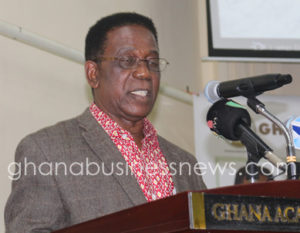Government worried about fraudulent qualifications – Prof Yankah
 Professor Kwesi Yankah, the Minister of State in charge of Tertiary Education has said the government was concerned about the increase in cases of fraudulent qualifications both for employment and further studies.
Professor Kwesi Yankah, the Minister of State in charge of Tertiary Education has said the government was concerned about the increase in cases of fraudulent qualifications both for employment and further studies.
He said currently, the authenticity of qualifications of teaching staff of all Technical Universities are being verified, and that is likely to be extended to staff of all public institutions in the country.
Prof Yankah, who said this in a speech read on his behalf at the second Annual General Meeting of African Qualifications Verification Network (AQVN) in Accra, said it was obvious that certificates presented for employment originated from both Ghana and other parts of the world.
The two-day meeting would enable the participants to share the latest trends and debates in verification and evaluation of qualifications; Share experiences of key achievements/products developed as well as challenges of verification related activities undertaken since 2017.
The meeting will also discuss matters arising from events organised by other networks, and issues concerning the Addis Convention as well as other global conventions and its links with the AQVN objectives; review the AQVN plan for 2018-2019; reiterate the mandate of the network, and develop a plan of action for 2019-2020.
Prof Yankah said the various qualifications found in national qualification systems and issues with mobility of academic, professional, technical and vocational labour at regional, continental and international levels obviously required collaborations, partnerships, and innovation to build effective and efficient systems for verification and recognition.
He said the network would not only facilitate verification and recognition of qualifications, but would also foster effective cooperation at all levels of development in the continent while complementing continental initiatives for integration.
“We want to assure the AQVN Council and all stakeholders present that Ghana is ready to support and participate in such initiatives for sustainable development in all areas and at all levels of education. Government will support any effort aimed at promoting the AQVN initiative, as it promises to contribute to the effectiveness of the verification process,” he added.
“We urge AQVN Council to come up with the appropriate good practice and guidelines for its members. It should also intensify the membership drive to advance its objective of getting the entire continent on board.”
Dr Kingsley Nyarko, Executive Secretary of National Accreditation Board (NAB), said the importance of education in the post-modern world with dynamic societies and pervasive technologies could not be overemphasized.
“In the 21st century, the liberalisation of tertiary education provision in most countries has led to increasing demand and internationalisation in the education landscape, especially tertiary education. The emergence of a globalised world and knowledge-based societies makes the demand, supply, usage and quality of education an international, rather than a national responsibility,” he said.
He said to build public trust and ensure objective and fair understanding of qualifications for purposes of admissions, job placement, promotion, among others, systems were put in place at the national level to verify and establish equivalence of qualifications.
Dr Nyarko said one of the pillars of academic mobility was the development of national qualifications framework, a credit transfer system and mutual recognition of qualifications, adding that qualifications frameworks had become a global phenomenon and a necessity for sustainable quality in the increasing globalided education environment.
Ms Miriam Chiyaba, Chairman of AQVN, emphasised the need for all member countries to continue the fight against fraudulent qualifications and said it was a shame for people to pay for their Honorary Doctorates only to return to their countries wanting to be called Honorary titles without earning them.
She also urged them to agree on issues that affected them in promoting genuine qualifications, especially how to recognise the qualifications of those seeking asylum.
Source: GNA
